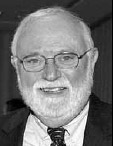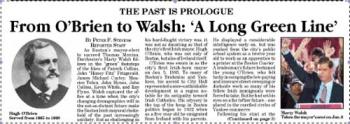
January 2, 2014

BY ED FORRY,
BIR Publisher
This January marks the end of an era in our city. On the first Monday of the New Year, Jan. 6, Hyde Park’s Tom Menino will step down as Boston’s Mayor, and Dorchester’s Marty Walsh will be sworn in as the new chief executive.
Born and raised in Savin Hill, and the son of two Irish immigrants, the incoming mayor traces his lineage back to Connemara in County Galway. Just as comfortable in Rosmuc as on Dot Ave., Marty Walsh as a boy regularly spent summer vacations with cousins back in the old country. Indeed, his election in November was front page news in the Connaught Tribune and the Galway Advertiser, and a TV crew from Ireland’s national broadcaster RTE was on hand to report on the election.
The Irish language broadcasters were excited to learn that Walsh is fluent in the Irish language – a linguistic skill not well known in the states!
Several Irish television and newspaper reporters are expected to be back in Boston to cover Walsh’s inaugural festivities, and scores of Galway relatives and friends, including the current mayor of Galway, Padraic Conneely, are also planning to be in town for the historic occasion.
Boston College’s Conte Forum will be the venue for the inaugural ceremony, a fitting place for Walsh, who graduated from BC after years of evening classes. Remarkably, he will be the first–ever mayor of Boston with a BC undergraduate degree. In fact, the year 2013 was a successful one in Massachusetts politics for Boston College graduates: Edward Markey succeeded John Kerry to become the first BC Eagle to serve in the US Senate, while Linda Dorcena Forry, a 1996 graduate, is the first woman to win elections to represent South Boston, along with Dorchester, Mattapan, and Hyde Park, in the State Senate. (Full disclosure: Senator Forry is married to my son Bill, and is the mother of four of my grandchildren!)
***
It’s a pretty safe bet that Mayor Walsh will make plans to visit Ireland sometime in his term, likely sooner than later. Ireland is easily the most accessible European destination for Boston tourists, with regular non-stop service from Logan, the overnight flight is just a little more than five hours, shorter than the travel time to LA or San Francisco. So the Irish can expect to see a few more visitors this year.
Even as the Irish economy seems to be trending in a positive direction, the country’s tourism industry is celebrating the success of 2013, the most successful year in half a decade.
The Irish Tourist Industry Confederation (ITIC) is issuing a year-end report projecting that as many as 7.5 million visitors are expected to visit the island in 2014, with a projected 6000 more jobs in the industry, according to a report in the Irish Times.
The good news comes on the completion of last year’s “The Gathering” promotion, developed by Tourism Ireland. That year-long drive saw more than one million visitors from North America, with 2.5 million more from the continent of Europe. It is estimated that as many as 2.9 million British visitors traveled to Ireland during the year.
The Times report said: “In an upbeat assessment of both 2013 and 2014, the Irish Tourist Industry Confederation (ITIC) says conditions for the industry are more benign than they have been for five years. ITIC chief executive Eamonn McKeon said, “all the lights are green for go” for next year with improving economies in Ireland’s three biggest markets, the UK, the US and Germany. In no occasion in the past have we had a situation where the three top economies are all good at the same time.”
“In addition new air and sea routes will help boost visitor numbers next year as will the opening of the Wild Atlantic Way, the ITIC maintains. ITIC is the latest tourism-related organization to deliver good news about an industry that has increased employment numbers by 15,000 in two years, bouyed by The Gathering last year. The confederation is particularly optimistic about the British market, which still accounts for 42 percent of all overseas visitors to Ireland and suffered the biggest decline since the recession started in 2008.”

